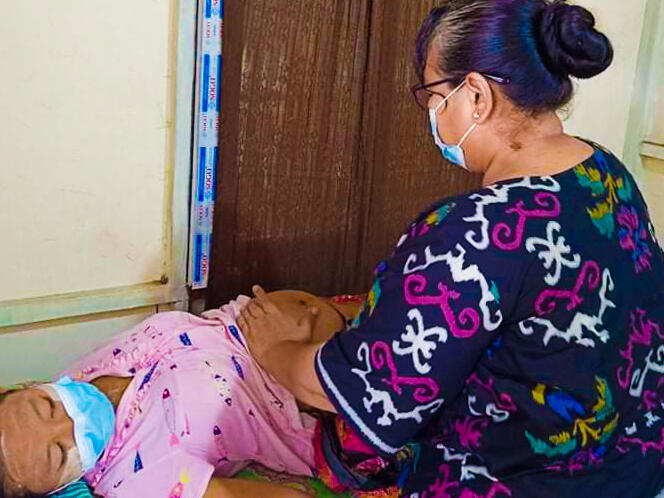Yangon, Myanmar – “Midwifery is my life and my passion. My parents used to travel a lot across the country especially to the remote areas of Myanmar when I was young. I saw how difficult the lives of the women particularly pregnant women have been in those areas where maternal health care services were hard to access. Since then, I wanted to help them as much as I can. This is why I chose my career as a midwife. Almost 40 years until now, I have dedicated my life to those in need,” said Aunty Thi, a community midwife.
According to the 2019 Myanmar Inter-censal Survey report, the urban population is only 28.8 per cent of the total population in the country while others are in rural areas. The lifetime risk of maternal death indicates that 1 in 200 women in Myanmar will die from either pregnancy or childbearing based on Myanmar Demographic and Health Survey (2015-2016). Therefore, midwives are the cornerstone for a functional health system, a point of contact in the community and institutions. They play a pivotal role in the reduction of maternal and newborn morbidity and mortality.
People living in remote areas need to be provided public health knowledge including sexual and reproductive health and maternal health. It is important that they are informed of maternal health and family planning. Aunty Thi shared her experience, “I used to support pregnant women under many difficult conditions during their birth. Lack of maternal health care and services sometimes lead to life-threatening complications and maternal and infant death. It is really heartbreaking situation. In Myanmar, there is a saying related to the vulnerability of a pregnant woman, ‘Being pregnant is one step closer to the cemetery’. Therefore, besides having access to services, dissemination of sexual and reproductive health and maternal health knowledge is extremely essential.
“Midwives not only deliver babies. We are sexual and reproductive health and rights promoters,” said Aunty Thi. Midwives have a strong link with the communities they serve. This enables them to overcome cultural barriers and create positive change for service delivery. Investing in midwifery care is a cost-effective way of not only saving the lives of women and children but also increasing their health and wellbeing for sustainable development.
UNFPA, United Nations sexual and reproductive health agency, advocates and works for strengthening the national midwifery services and providing support to upscale the capacity of midwives in Myanmar in order to contribute to the accomplishment of one of three zeros, “ZERO preventable maternal deaths”.
In the context of the ongoing political crisis in Myanmar, the need for sexual and reproductive health services and rights have only become more important. The community needs midwives in the current situation more than ever to save the lives of adolescents, young people, mothers and babies. Aunty Thi is currently serving the community as a midwife in Hlaing Tharyar Township in Yangon Region, one of the most affected areas during the crisis. Even under the night curfew, she never stops providing life-saving services for pregnant women. She said, “I helped a woman giving birth in a car in Hlaing Tharyar successfully. As a midwife, I always prepare for every circumstance, mostly in emergency to save two attached lives – a mother and a baby .”
UNFPA Executive Director Dr Natalia Kanem mentioned in International Day of the Midwife 2021 that midwives deserve our respect and gratitude, but it is not enough. They deserve greater investment in their capabilities and workplaces that empower them and fully acknowledge their skills and contributions. In addition, the State of World’s Midwifery report 2021 underscores the needs to increase the number of midwives and the quality of their services so that it could save 4.3 million lives a year by 2035.
Aunty Thi is now over 60 but age has not weakened her strong commitment to saving women and girls in the community. She said, “I started my career as a midwife. I am still doing this to help the people. I will try supporting them until my last breath. This is my commitment!”
On the occasion of the International Day of the Midwife, UNFPA Myanmar salutes Aunty Thi and the many hundreds of midwives for their unwavering commitment and dedication towards ensuring sexual and reproductive health and rights in communities in Myanmar.


